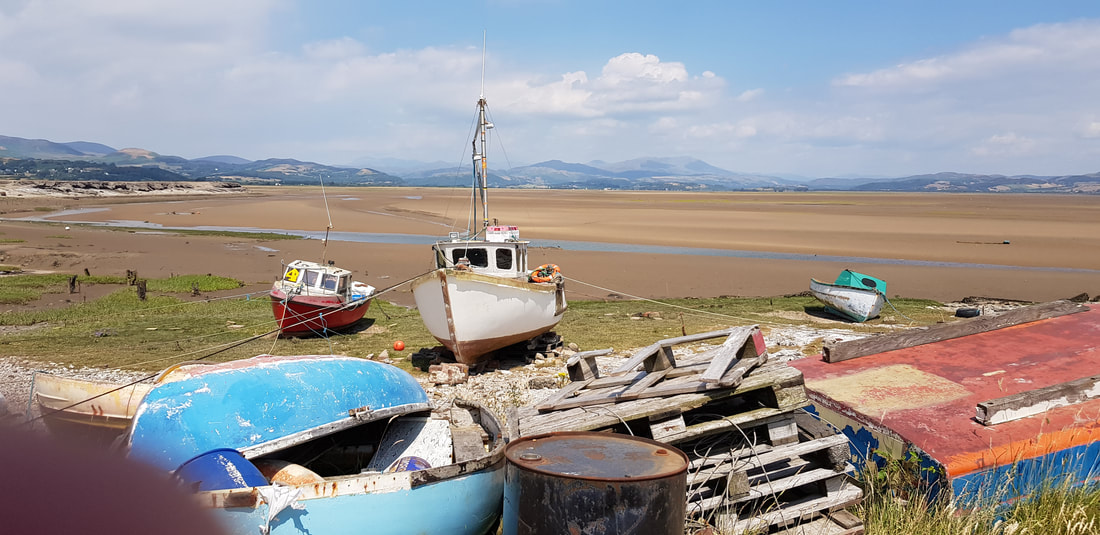 Mary Robinson Mary Robinson
July 2018........................
Brog by MARY ROBINSON … Here is the track: The ruts of cartwheels filled with water, the dark Brogs of broom. The poem ‘Across the Estuary’ was published in Rock Face in 1948, reprinted in Selected Poems in 1966 (without the second section) and printed in full in Collected Poems in 1994 (page 166). A helpful footnote explains: In the days when the estuaries of Morecambe Bay and South Cumberland were crossed regularly by travellers on foot and by coach the guides marked the track by planting branches of broom in the sands. This was called ‘brogging the sands’. The poet is thinking back to the days before rapid road transport, before the railway. The ruts are ‘ruts of cartwheels’, a reminder of the description in Wednesday Early Closing (p47) of the reluctance of Norman Nicholson’s grandmother to come to Millom: [She] crossed from Askam-in-Furness by horse and cart over the estuary of the Duddon at low tide, following the old cross-sands route. When she saw what Millom looked like … she told the carter to turn the horse’s head round and go back. But the tide had turned and she had to stay. ‘Brog’ can be used as a noun or a verb. The short vowel and the hard-sounding consonants suggest a no-nonsense, practical word – as definitions of the word prove. The Oxford English Dictionary (OED) defines ‘brog’ as a pointed tool or a stick. It is a word shared with Gaelic where it means a sharp-pointed instrument, and with Scots where it means to pierce. One of the OED’s definitions of ‘brog’ as a noun is ‘a short stick, especially one to stick in the ground, e.g., those stuck in the Sands of North Lancashire to indicate the crossing’; and as a verb, ‘to insert pointed sticks [into the ground]’. The OED gives two Lancashire dialect examples from 1870 (Barber Hutton Folk): We’d gitten by t’last brog, an’ off t’sand. After obtaining a safe ford, the guides … mark out the track by inserting branches of trees. This is called ‘broggin’ t’ channel’. Joseph Wright’s English Dialect Dictionary of 1898 gives a similar definition of the noun ‘brog’: ‘A branch of a tree, a broken bough, a short stick; especially the branches that are inserted on the sands to mark out the track.’ This usage is described as ‘fairly common’ and Wright cites an example of ‘branches of furze, called brogs’ from Waugh Rambles in the Lake Country 1861. The earliest example given by Wright is from Morris Siege of Broughton 1661: If ye sa a brog on t’sand ye would think it was t’French. Obviously on a state of high alert! (My thanks to Antoinette Fawcett for pointing me in the direction of Wright’s English Dialect Dictionaryon-line.) |
|
I crossed the Sands from Kent’s Bank to Silverdale one early evening in May 1995. Cedric Robinson, the Queen’s Guide (who received the MBE in 1999), had brogged the Sands, not with broom but with small branches of laurel. We started to cross as the tide receded, the aim being to be furthest from land at the lowest state of the tide. I thought of the poem ‘Across the Estuary’. We were crossing ‘the threshold of the sea’. There were showers of rain and dark lowering clouds over the fells:
The worlds of field and farm, the woods and the embankment Are blurred away. When we reached the two river channels Cedric instructed us to link arms to withstand the force of the current. The water came up to the top of my legs – Thigh-deep in fresh water I waded the channel Before the ebb turned. Fortunately I had left some dry clothes at Silverdale! I remember seeing a small group of red deer crossing over the Sands and hearing ‘shelducks jangle’. The crossing gave me an insight into the poem and into the experience of previous travellers, like Norman Nicholson’s grandmother. I had been in safe hands with Cedric’s intimate knowledge and experience of the Sands. But in the poem, in the confusion of mist and shifting sand, the traveller loses sight of any safe brogged track. The poem ends with the incoming tide and the chilling last line: There is no sign of traveller on the flat waters. Hard not to think of the tragic deaths of the Morecambe Bay Chinese cockle-pickers, cut off by the tide with no brogs to lead them back, in 2004: It is not then but now That tightens like mist about me. Just as the landscape/sandscape is blurred by ‘the fog’ that ‘floats in with the tide, so the poet blurs the boundaries between describing an actual crossing and using the crossing as a metaphor for inner experience – losing his way in life, being unsure of the future: The past slides Like sand beneath my feet and The inevasible choice of wrong and less wrong Is forgotten or deferred. Even the cormorants ‘curl black question-marks’ above the sea. Norman Nicholson’s use of the word ‘brog’ is exact – no other word will do. It is emphatic, placed at the beginning of the line – ‘Brogs of broom’, a phrase that is both alliterative and precise. But notice that adjective at the end of the preceding line – they are … dark Brogs of broom. The word “dark” will be repeated three lines later when … the broom Skulks back into the dark setting the tone for the unfolding of the rest of the poem. Editor's note
Before the county boundary changes of 1974, the Cartmel and Furness peninsulas and parts of the southern Lake District were in Lancashire; hence some of the references above. Millom was in what was then Cumberland. All are now part of Cumbria. Nicholson’s grandmother was not the first to regret an estuary crossing. In the eighteenth century John Wesley, Whitehaven-bound on a preaching tour, traversed Morecambe Bay and the Duddon and Esk estuaries (calling the former ‘the Millam-Sand’). His tetchy Journalentry for 12 May 1759 is amusing to read. Wesley informs us he has - … taken my leave of the sand road. I believe it is ten measured miles shorter than the other [i.e. over land – Ed.]: but there are four sands to pass, so far from each other, that it is scarce possible to pass them all in a day: especially as you have all the way to do with a generation of liars, who detain all strangers as long as they can, either for their own gain or their neighbours’. I can advise no stranger to go this way: he may go round by Kendal and Keswick often in less time, always with less expense, and far less trial of his patience. Ann Thomson |

